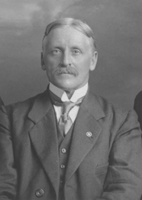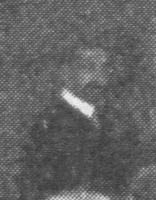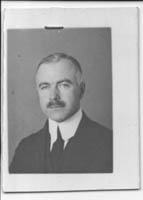Table of Contents
Key Figures
YMCA Secretaries
a | b | c | d | e | f | g | h | j | k | l | m | n-o | p | r | s | t-u | v | w | y-z
Theodore Giesendorf
A Swiss pastor, Reverend Giesendorf accepted a temporary vacancy as the curate of the Swiss Church in London in 1897. He returned to Switzerland in 1898 and served as the President of the Swiss Christian Student Federation. In November 1899, Giesendorf accepted the Assistant Secretary position with the French National Council and became the General Secretary of the Marseilles Association the next year. Interested in Boys' Work, Giesendorf represented Switzerland at the First World's Conference of YMCA Workers with Boys in Oxford in July 1914. When the war broke out in Europe, Giesendorf decided to provide relief work for French and Belgian soldiers interned in Switzerland. From 1915 to 1918, he was the Chairman of the Commission Suisse Romande. In November 1917, Giesendorf became a member of the secretarial staff for the World's Committee for War Prisoners' Aid (WPA) services. Responsible for World's Alliance relations with the Allied Powers, Giesendorf worked in Paris to establish a committee for the distribution of circulating libraries to isolated prisoners of war, using the Geneva office as the authorized intermediary. Giesendorf also recruited Swiss secretaries to serve as WPA Secretaries in French prison camps. He was also in charge of Information and Public Services until he retired from the Association in 1922. Giesendorf participated in the Executive Committee meeting in Geneva in April 1918 when John R. Mott visited Geneva and addressed the growing tensions between the World's Alliance and the American YMCA.
Herbert Sydney Gott (1887-1954)
Before becoming an American YMCA Field Secretary during World War I, Gott went to college and became an engineer. He began working at the New York YMCA in 1913 as a Boys' Work Secretary and transferred to Boston. In October 1916, Gott traveled to Russia to serve as a War Prisoners' Aid Secretary. He first worked in the WPA Headquarters in Petrograd and was assigned to the Transbaikal region in April 1917, working out of Tschita. During the Russian Civil War, Gott worked with Russian soldiers at Irkutsk in Siberia and established the Harbin Association in Manchuria in 1918. He returned to WPA work in Germany, working with Russian prisoners, until 1920. In December 1920, Gott established refugee relief services in Estonia, with the assistance of Amos Ebersole and Charles Seitz, supporting repatriation operations for Russian and Central Power prisoners of war. From 1920 until 1931, Gott became the National Secretary for Estonia, establishing a successful YMCA movement in that Baltic nation.
W. Gottsched
A Swiss pastor, Reverend Gottsched responded to Emmanuel Sautter's call for volunteers to provide relief services to prisoners of war early in 1915. The World's Alliance sent Gottsched to Paris in March 1915, initially tasked with sending parcels to POW's. Because of his French sympathies, the French Ministry of War approved Gottsched's appointment to work with Central Power prisoners of war and Gottsched developed a strong working relationship with the United States embassy staff. These relationships gave him a great deal of access to French prison camps. Gottsched returned to Geneva where he became the first editor of The Messenger to Prisoners of War, a World's Alliance newspaper designed for war prisoners. Ernst Sartorius later replaced Gottsched as the newspaper editor.
Jean Paul Graenicher
At the request of the Société de Secours aux Prisonniers bulgares in August 1919 and the Bulgarian government in September 1919 to provide POW relief for Bulgarian prisoners of war and internees in Greece and the Kingdom of Serbs, Croats, and Slovenes, the World's Alliance decided to send Jean Paul Graenicher and Fritz von Steiger to investigate the situation. Graenicher and von Steiger conducted negotiations with the Greek and Yugoslav governments and inspected prison camps in both countries. Both kingdoms invited the YMCA to set up War Prisoners Aid (WPA) operations and the two World Alliance secretaries established centers in Athens and Belgrade. Graenicher and von Steiger began WPA work in Greece in November 1919, setting up service in nine prison camps, including two on Crete, and in the Kingdom of the Serbs, Croats, and Slovenes by March 1920.
Johann Grote
In response to the call for workers for the War Prisoners' Aid program in Germany, this German YMCA secretary volunteered to serve Allied prisoners of war. Grote began working in prison camps in June 1915, when Archibald Harte inaugurated the program, and continued to provide service after the American WPA Secretaries left in February 1917 as the latter were replaced by neutral Association workers.


